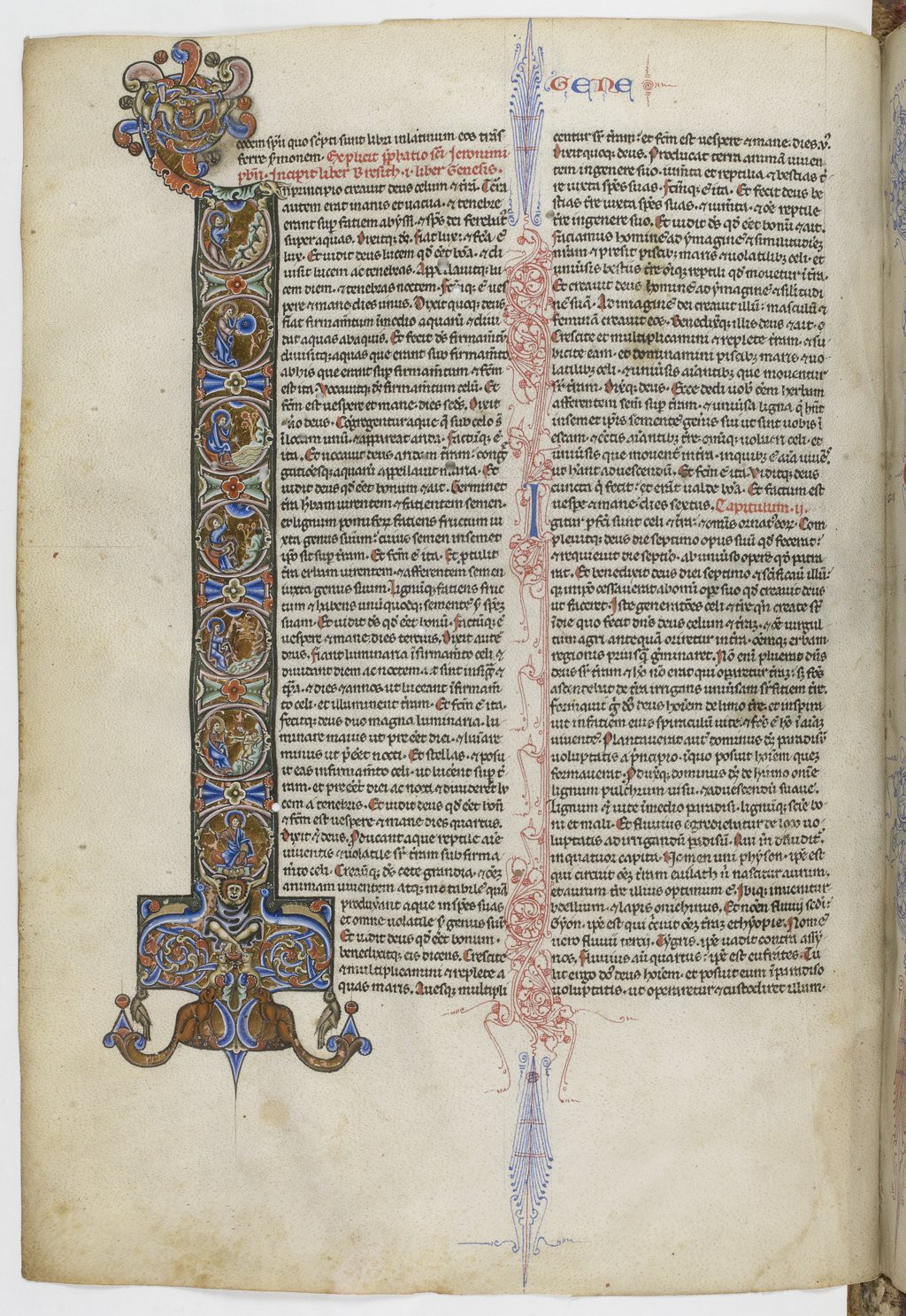Welcome to the Paris Bible Project!
The blog of the Paris Bible Project (PBP) aims to be a repository of knowledge and material of all the different activities of the Paris Bible Project. After meeting in the context of the 2020 Winter Institute in Digital Humanities at New York University Abu Dhabi, the two project Co-Directors, Associate Professor of Digital Humanities, David Joseph Wrisley, and Medievalist and Assistant Researcher at Louvre Abu Dhabi, Estelle Guéville, developed the project, starting from a digitised version of the Parisian Bible held in the collection of the Louvre Abu Dhabi. The Paris Bible, or Parisian Bible, is a format of Bible that was standardised in the 13th century in the context of the University of Paris and spread as a model throughout Europe. In the spirit of collaborative research among institutions, the University and the Museum initiated the Paris Bible Project to understand the production and diffusion of medieval Latin Bibles in Europe, which are now kept in libraries around the world, through the use of digital tools, such as the AI-powered platform for handwritten text recognition, Transkribus.

©DJW (Wikipedia)
As the COVID-19 pandemic pushed for digitisation of cultural activities and research, the PBP started out of necessity to ask a question: what can Digital Humanities provide for the study of Parisian Bibles? The answer is an ongoing discussion that includes the use of different tools, from Artificial Intelligence to Geospatial data, to continue and enrich the relationship between Medieval Studies and Digital Humanities and on the potentialities of institutional collaborations. If our primary goal is to have an academic understanding of the diffusion of Parisian Bibles, this research project opens multiple doors to discourses on partnerships, engagement, and inclusion by looking at the museum object through different lenses. Doing digital research implies a different approach to the object, which still represents the centre of the study but through its virtual form. This methodology requires the use of adapted tools and extends the array of possible questions.
The starting point of the academic research was to challenge the idea of uniformity of the Paris Bibles. Despite the fact that it consists of a standardised format, the text reveals several issues showing evidence for a variance of the model. For instance, looking at the use of abbreviations, it is possible to notice different approaches to the text (use of diacritics, ways to abbreviate, separation of words). The machine learning methodology lends itself to the analysis of these aspects of the Paris Bible that the human could not process in a short amount of time (let alone the reading of full Bibles that would require months of work on just one manuscript). Through the use of digital tools, the Paris Bible Project takes as its case study the script rather than the decorations to discover glimpses into the manuscript’s social life, while also furthering research on digital humanities and its approaches.

©Bibliothèque nationale de France, ms. Latin 40 - Source gallica.bnf.fr / Bibliothèque nationale de France
This virtual space will serve as a multidisciplinary platform to collect and publish the activities of the Paris Bible Project. The blog will have multiple approaches and head towards different directions in range, themes, topics, and styles to provide an array of the projects and initiatives undertaken. One of the focuses of this blog will be to offer suggestions and tips on how to use Transkribus (to be posted soon!) in the context of 13th century Latin Bible manuscripts at the core of the PBP. Other themes will include different uses of digital tools to generate new knowledge (e.g. Bible mapping), how to gather sources from digital platforms, or the general procedures of a research project (e.g. How to take notes on a transcription?). We will also publish some of our results and provide updates on activity (conferences, papers, etc.). We hope that these posts will help you to be more interested in the union of Medieval Studies and Digital Humanities in regards to Parisian Bibles.
For any inquiries, suggestions, requests, the team can be reached at parisbible@gmail.com
Niccolò Acram Cappelletto, Estelle Guéville and David Joseph Wrisley
Further readings and presentations:
- Burrows, Toby. (2017). Medieval Manuscripts and their (digital) afterlives. In J. E. Boyle and H. J. Burgess (Eds). The Routledge Research Companion to Digital Medieval Literature. United Kingdom: Taylor & Francis Group, 158-166.
- De Hamel, Christopher. (2001). The Book. A History of the Bible, London and New York.
- Guéville, Estelle, and Wrisley, David Joseph. (2020). Rethinking the Abbreviation: questions and challenges of machine reading medieval scripta. Dark Archives 20/20, 9 September 2020.
- Hamidovic, David, Clivaz, Claire, and Bowen Savant, Sarah, eds. (2019). Ancient Manuscripts in Digital Culture: Visualizing, Data Mining, Communication. Leiden: Brill.
- Lauwers, Michel. (2008). Usages de la Bible et institution du sens dans l’Occident médiéval. Médiévales, 55.
- Light, Laura. (1994). French Bibles c. 1200-30: a new look at the origin of the Paris Bible. In R. Gameson (Ed.). The Early Medieval Bible: Its Production, Decoration and Use. Cambridge: Cambridge University Press.
- Light, Laura. (2012). The Thirteenth-Century Bible: The Paris Bible and Beyond. In R. Marsden and E. A. Matter (Eds). The New Cambridge History of the Bible. Volume two, c. 600-1450. Cambridge: Cambridge University Press.
- Lobrichon, Guy. (2003). La Bible au Moyen Age. Paris: Picard.
- Ruzzier, Chiara. (2010). Entre universités et ordres mendiants. La Miniaturisation de la Bible au XIIIe siècle. PhD Thesis. Université Paris 1 Panthéon-Sorbonne, Paris.
- Widner, Michael. (2017). Toward Text-Mining the Middle Ages. In J. E. Boyle and H. J. Burgess (Eds). The Routledge Research Companion to Digital Medieval Literature. United Kingdom: Taylor & Francis Group, 131-144.
You can also consult the bibliography of the project on Zotero.
Suggested citation
Cappelletto, Niccolò Acram, Guéville, Estelle, and Wrisley, David Joseph. (8 June 2021). Welcome to the Paris Bible Project Blog! Paris Bible Project. https://doi.org/10.5281/zenodo.8040632
This post is published with a CC BY-SA-NC 4.0 International license.